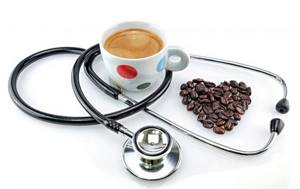Those who like to drink a lot of coffee are often afraid that it leads to an increase in blood pressure (BP) and is generally harmful to the cardiovascular system. In fact, the effect of this drink is somewhat more complex than just raising blood pressure; it triggers a whole series of reactions and processes in the body. And their result will depend on several factors: frequency of use, quantity, type of grains and the state of human health. Let's try to understand in more detail whether coffee increases blood pressure, has an expanding or constricting effect on blood vessels, and how it generally affects a person.
The effect of coffee on the cardiovascular system
Caffeine, the main active ingredient in coffee, has a much greater effect not on the heart and blood vessels, but on the brain. In particular, it suppresses the production of adenosine, a substance actively involved in metabolism, including transmitting signals of fatigue to the brain. Accordingly, he considers the body to still be vigorous and active.
If we talk about the effect on the cardiovascular system, then coffee can dilate blood vessels (in particular in the muscles), or it can constrict - this effect is observed with blood vessels in the brain and digestive system. In addition, the drink increases the production of the hormone adrenaline by the adrenal glands, which already contributes to an increase in blood pressure. True, this effect does not last long - it begins approximately half an hour to an hour after drinking a cup of drink and subsides after another couple of hours.
Also, from simultaneous consumption of a large volume of strong coffee, short-term vascular spasm can occur - this also contributes to an increase in blood pressure for a short period. All this occurs not only when drinking coffee, but also other caffeine-containing products, including medications. In particular, the popular anti-inflammatory and analgesic drug askofen also increases blood pressure.
When drinking coffee regularly to increase performance and blood pressure, the following happens: on the one hand, the body reacts less to caffeine or stops doing so completely. On the other hand, the pressure may stop decreasing to normal, i.e., so-called persistent high blood pressure appears. However, the second is only possible if a person drinks coffee really often and in large quantities, even from 1-2 standard-sized cups per day for several decades, such an effect is unlikely. Another aspect of the effect of caffeine on the human body is its diuretic effect, which leads to a decrease in blood pressure.
Thus, in a relatively healthy person who drinks no more than a couple of cups of coffee daily, if the pressure increases, it will be insignificant (no more than 10 mm Hg) and short-term. Moreover, in about 1/6 of the subjects, the drink slightly reduced blood pressure.
Does coffee raise or lower blood pressure?
Spasm of blood vessels, their narrowing and decreased capacity for blood can only lead to increased blood pressure in a person. First of all, people who, due to physiological reasons, have high blood pressure should remember this.
A healthy person should also remember this feature of caffeine if he decides to drink coffee before bed. If you have no problems with sleep, and your cardiovascular system is in perfect order, then this will probably pass without a trace for you. But for most people, drinking coffee at night will not end well. An excited nervous system, high blood pressure and, at best, mild arrhythmia will keep you from falling asleep for a long time.
And also read on our website: How ginseng affects blood pressure - it increases or decreases the levels, as well as a recipe with honey and tincture
There is a misconception that only natural coffee greatly increases blood pressure. This is not true - although instant coffee has less caffeine and is of lower quality, its amount is still enough to cause all of the above symptoms. Coffee with milk is also no different, except for its taste.
Coffee and ischemia
Coronary heart disease is a pathological condition caused by a sharp and significant decrease in its blood circulation and, as a consequence, oxygen deficiency. It can manifest itself both in acute form - in the form of a heart attack, and in the form of chronic attacks of angina - painful and uncomfortable sensations in the chest area.
Repeated, long-term and extensive studies by scientists from different countries have proven that coffee does not in any way increase the risk of this problem and does not increase its manifestation in people who already have ischemia. Some studies have even proven the opposite - CHD in those who regularly drink a couple of cups of strong drink was on average 5-7% lower than in those who rarely or almost never drank it. And even if we consider this fact to be a consequence of a random coincidence and statistical errors, the main result remains unchanged - coffee does not provoke cardiac ischemia and is not harmful if it is present.
We only drink coffee correctly
What should hypertensive patients do: not drink at all or sometimes treat themselves to a cup of aromatic drink? How much, when and how, just to improve your well-being.
The only way to use coffee in your diet if you have high blood pressure is this:
- Do not exceed 1-2 cups of drink per day.
- Brew a weak drink.
- Avoid instant coffee.
- Switch to whole grain coffee only.
- Don't drink coffee on an empty stomach.
- Not a sip of coffee after 17.00-18.00.
- After serving, drink clean water.
- The interval between doses is 6-7 hours.
When should hypertensive patients not drink coffee?
- In a state of anxiety.
- In discomfort due to heat or cold.
- After increasing the pressure.
- Before stress and heavy physical work.
- On an empty stomach or at night.

Combination with other ingredients:
| What do we add? | What is the impact |
| Milk or cream | Fat molecules from dairy products slow down the absorption of caffeine into the blood and cause unexpected jumps in blood pressure. Milk contains calcium, the loss of which increases due to coffee, so that the microelement balance returns to normal. This is especially important for people over 50 years of age and pregnant women. |
| Lemon | A slice of lemon eaten separately will lower blood pressure, but after a cup of coffee the numbers on the blood pressure monitor will go up. This recipe is optimal for hypotensive patients and those who suffer from headaches. |
| Cinnamon | Seasoning does not affect the pressure either upward or downward. |
| Ginger | The benefits of ginger are simply amazing. But no one can say for sure how its interaction with coffee occurs. |
| Alcohol | Cognac and liqueurs in a cup will immediately respond to a rise in pressure. That is why the invigorating effect of the drink is negated by alcohol. The recipe is delicious, but you shouldn’t turn it into a daily ritual. |
| Sugar | It is better to use for hypotension, but without overdoing it. To ensure that the pressure rises smoothly, sweet coffee is drunk without haste and without sweet desserts. |

How do different types of coffee work?
| Drink | What is the impact |
| Classic from ground beans | The maximum benefit comes from coffee made from freshly ground beans. It must be filtered. |
| Soluble | Drinking coffee powder or granules is simply risky for hypertensive patients. There is too much caffeine, no vitamins and minerals, but there are dyes and other chemicals. A cup of instant coffee - and a sharp increase in blood pressure by at least 3-5 units is guaranteed. |
| Cafein free | Still, it is not completely cleared of caffeine, which is why it threatens to raise blood pressure in hypertensive patients. If the pressure is normal or low, then the daily limit is 3-5 cups. |
| Green | This product activates metabolism and lowers sugar levels. Use only 2-3 servings per day. If the pressure is low, then green coffee will improve the tone of the blood vessels in the brain, activate the heart, and optimize blood flow in the capillaries. If your blood pressure is constantly elevated, then you should not drink the drink, although a drink made from unroasted grains does not raise blood pressure levels. |

Impact on hypertensive patients
In people with persistently elevated blood pressure relative to normal, the effect of a strong drink will be more pronounced and stronger; it can quickly and sharply rise to critical and life-threatening values. Does this mean that it will have to be abandoned completely and forever? No, but you should definitely consult with your doctor about the permissible frequency and portions of drinking coffee so that the harm to blood vessels and the heart is minimal.
Recommendations:
- The less coffee there is, the less it will affect your blood pressure. In other words, you should reduce portions and/or add as much milk or cream to the cup as possible. The latter, by the way, is especially useful, especially for older people with their already fragile bones due to age, because with regular consumption of this drink, quite a lot of calcium is washed out of the body, and dairy products will help compensate for its deficiency.
- Preference should be given to ground coffee beans rather than instant coffee. It is advisable to choose varieties with coarse grinding. Taken together, this will significantly reduce the effect of the drink on blood pressure.
- To prepare the drink, it is advisable to use a Turk or espresso machine, rather than a drip coffee maker.
- It is advisable to drink a cup of your favorite drink not immediately after waking up, but about an hour or later.
- Choose varieties with the least amount of caffeine, for example, Arabica, where it is slightly more than 1%. For comparison, in other popular varieties, Liberica and Robusta, there is already 1.5-2 times more of this substance.
- It is also worth taking a closer look at the so-called decaffeinated drink, i.e., one that does not contain caffeine. It is removed forcibly using steam treatment and various solutions with chemicals that are safe for health. As a result, at least up to 70% of caffeine is removed, or up to 99.9% if the coffee is produced according to EU standards. Decaffeinated varieties of the Cameroon and Arabica varieties were discovered in nature in the early 2000s, and their appearance is associated with a random mutation in the plants.
Of course, all these recommendations are suitable not only for those who already have problems with high blood pressure, but also for all people who want to play it safe and minimize the effect of caffeine on their cardiovascular system.
Is it possible to lower blood pressure?
No, It is Immpossible. In any case, caffeine will have the same effect on blood vessels for each person, and not necessarily a negative one. If the standards are observed, coffee does not harm a person, but, on the contrary, acts to his benefit:
- increases performance;
- normalizes the functioning of the heart and other organs of the cardiovascular system if a person initially has low blood pressure ;
- removes salts and excess fluid from the body;
- enriches the body with some unique vitamins and microelements.
You can drink coffee in order to get all these beneficial properties without fear of lowering your blood pressure.
Impact on other body systems
The main effect of this drink, as already mentioned, is aimed at the nervous system. The short-term result of this is an increase in concentration, memory and productivity. In the long term, caffeine can become addictive, causing a person to feel sluggish and unfocused without it.
Along with this negative phenomenon, there are also positive effects from drinking the drink - it increases the effectiveness of a number of painkillers (in particular, paracetamol), and with long-term use, it reduces the risk of Parkinson's and Alzheimer's diseases.
In the digestive system, coffee reduces the frequency and severity of constipation and also reduces the likelihood of liver cirrhosis. However, due to the diuretic effect, there is a need to increase the amount of fluid consumed.
The long-standing debate about the connection between coffee and oncology has come to an end - since the summer of 2021, it has been unequivocally recognized as not being a carcinogen. Moreover, regular consumption of moderate amounts of this drink can reduce the risk of certain specific types of cancer - prostate and breast cancer.
Coffee Research
Scientists have identified many features and properties of coffee that people suffering from pathologies of the nervous system and heart diseases need to pay attention to. Healthy people should not consume more than their daily dose of coffee. You are allowed to use 600 mg of caffeine per day.
To prevent the drink from affecting important systems in the body, you must adhere to the following regimen:
- Don't drink coffee before your first meal.
- Do not consume immediately after a heavy lunch.
- Do not take even small amounts before bedtime.
- If you reach old age, you should stop drinking coffee every day. Drink it no more than 2-3 times a week.
With frequent use, the following complications may occur:
- Cardiovascular pathologies.
- Rheumatic arthritis.
Daily consumption of coffee in excess of the norm can affect the worsening of the condition of patients with the following diseases:
- Ischemia.
- Hypertension.
- Atherosclerosis.
- Kidney pathologies.
- Insomnia and other sleep disorders.
Coffee has a stimulating effect on the cells of the nervous system. With regular use, the drink can overcome depression and accelerate the production of serotonin. As a result, a person’s self-esteem increases and anxiety disorders are eliminated.
Professor Georges Debry studied the effect of coffee on the body and came to the following conclusions:
- Daily use in small dosages does not hasten the onset of myocardial infarction.
- It is not a predisposing factor to the development of hypertension.
- If it enters the body in large quantities, it is possible to accelerate the process of calcium removal and cause disruptions in the functioning of the gastrointestinal tract.
- Moderate consumption helps to normalize the structure of vascular walls and increase their elasticity.
Numerous scientific studies have proven that regular coffee consumption increases blood pressure by just a few units. If you completely abandon it, you can lower your blood pressure by one unit. Pathologies of the nervous and cardiovascular systems can occur in people who drink this drink in excessive quantities.
Coffee and pregnancy
Drinking a coffee drink, especially in large quantities, is extremely undesirable during the period of bearing a child - this leads to a noticeable increase in the fetal heart rate, lowers its pressure and reduces blood flow to the placenta.
If a pregnant woman drinks more than 5-7 standard cups per day, such abuse is fraught with more serious consequences - the risk of miscarriages, stillbirth, premature birth and the birth of children with a low body mass index significantly increases.
We can conclude that with moderate consumption of coffee, it does not lead to any serious vascular or cardiac pathologies in a relatively healthy person, and if coffee does increase blood pressure, it is only slightly and for a short period of time. However, excessive and too frequent use of this drink can be harmful, especially when it comes to a woman carrying a child.
During pregnancy
Pregnancy is a special, albeit natural, state of the female body. Most of the forces, including those intended to support the mother's immunity, are now almost completely transferred to the developing fetus. A woman will endure an increase in blood pressure in such conditions much worse than in a normal state.

There is no complete ban on drinking coffee during pregnancy; instead, there is a permissible limit for a woman to consume caffeine for one day - 200 mg. If this norm is violated, blood pressure may rise not only in the pregnant woman, but also in the fetus, which is still completely dependent on the stable functioning of the maternal systems.
Excessive coffee consumption can lead to an attack, during which the chances of harming the child increase significantly. If necessary, a pregnant woman can take up to 500 mg. caffeine per day, but in no case on an ongoing basis, only in the form of an isolated case.
The difference between natural and freeze-dried?
No modern equipment or qualifications of chemists who carefully monitor the process of making instant coffee can replace a natural product. The imitation can be of very high quality, even ideal for the average consumer, but anyone who has at least once tried real ground coffee from naturally grown beans will never again confuse it with a surrogate.
And also read on our website: How does red wine affect a person’s blood pressure - does it increase or decrease them?
There is nothing wrong with instant coffee; it fulfills its main functions (the effect of an energy drink, and in the case of a high-quality product, a good imitation of taste). The methods for producing artificial coffee are very different, since the demand is huge, which means the list of manufacturers who supply it to the shelves is huge.
It is quite expensive to imitate natural coffee in composition, so some manufacturers save money. As a result of these savings, instant coffee is usually less strong than natural coffee.

This is even beneficial for people suffering from hypertension. A cup of instant coffee will cause less harm than the same cup brewed with a natural base. There is no need to hope for this difference.
Firstly, in artificial coffee (especially cheap) the manufacturer may use harmful additives that may hit the body harder than caffeine. Secondly, this difference is very insignificant and at a dose exceeding the minimum it will cease to matter.
How does coffee affect your health? Beneficial features
The beneficial and harmful qualities of coffee are revealed in numerous studies. The positive effects of this drink on the body should not be neglected. If you do not notice any obvious side effects when drinking 2-3 cups of the drink per day, there is no need to worry about the harmful effects of coffee.
Positive effects that can be obtained from regular coffee consumption:
- Activation of the internal forces of the body.
- Increased endurance and physical activity.
- Prevention of caries, destruction of tooth enamel.
- Elimination of harmful microorganisms from the oral cavity.
- Collagen products. This substance is necessary to prolong the youth of the skin and increase elasticity.
- Quickly eliminate fatigue, relieve tension.
- Increasing the metabolic rate in the body.
- Activation of peristalsis processes, normalization of stool.
- Help in losing weight, which is especially important for people who are overweight.
- Elimination of depression, increased sleepiness.
- Reducing the risk of diabetes.











